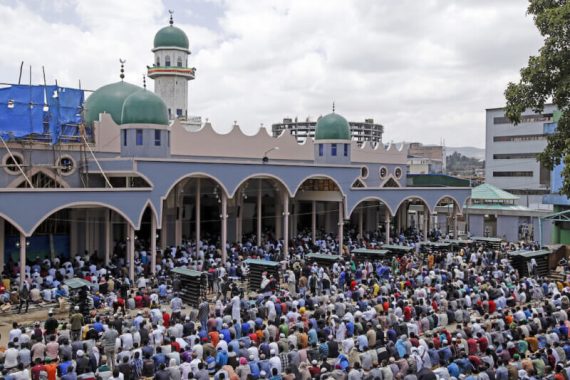W
hile enjoying a relative peace following the resolution of the Tigray dispute, Ethiopia today finds itself on the verge of yet another conflict, this time for a different reason: the demolition of mosques. In recent weeks, the government of Ethiopia has been under heavy fire from Ethiopia’s Muslim population over claims that it has been targeting Muslims and destroying their places of worship.
What happened?
The area in question, where most of the mosques are situated, is on the outskirts of Addis Ababa, the capital city. The area has long been a part of Addis Ababa’s administration, and the region has been expanding for years through land purchases and other means, which the government claims are all “illegal.” The Ethiopian government planned to demolish the “illegal” settlement this year and replace it with a new metropolis named “Sheger City” as part of an urban planning initiative that will put the area under the jurisdiction of the Oromia region.
To carry out the project, the Ethiopian government began demolishing houses, mosques, and churches with no title deeds to provide a new space for investment and transformation, turning the area into government property.
However, as the new urbanization process unfolded, the Muslim population expressed dissatisfaction with the approach, leading to tensions. Muslims asserted that among all the places of worship, mosques were being targeted more severely by the government. The Mejlis (Ethiopian Islamic Affairs Supreme Council), an organization in charge of the country’s Islamic affairs which is frequently tasked with addressing such issues by interacting with the government, emphasized that they were already discussing matters with the government and urged people to be patient.
Although the Mejlis stated that it was attempting to deliberate with the government to stop the ongoing demolitions, the Ethiopian government was unwilling to engage in any form of dialogue. Hence, Muslims became enraged and decided to stage peaceful protest on May 26 after the Friday prayer at the Grand Anwar Mosque in Addis Ababa. The Ethiopian security forces responded by firing shots and using tear gas, which led to the deaths of at least two citizens, and dozens of injuries and arrests.
The protest’s organizers remain unknown. Even though there were no organized protests on the following week, there were reports of government security officers allegedly acting aggressively again and employing excessive force against individuals calmly leaving the mosque after praying. It is alleged that this violent crackdown caused the death of at least eight people, and many criticized the Ethiopian security officers’ unnecessary use of force, which caused the incident to become viral.
Who is wrong?
First, it is imperative to scrutinize the urbanization process. Even though the matter gained greater attention and prompted widespread outrage and indignation when mosques were involved, people’s discontent with the government’s actions was already present.
Setting a goal of demolishing at least 400,000 homes in the future, the Ethiopian government has already destroyed close to 110,000 and has declared that it will keep doing so. It’s interesting to note that these homes pay their water and electricity bills to the state. Additionally, the area has grown so much over the past few years that many people have moved there and constructed their places of worship, indicating that state authorities have been involved in land and real estate transactions.
Mosques are no exception to this construction activity: there are over 300 “illegal” mosques and the Mejlis has been unable to legalize them due to bureaucratic restrictions. At the same time, other religious institutions like churches have been legalized without any difficulty, accounting for the disparity. The Ethiopian government asserts that it is not targeting mosques; however, the visible disproportion of demolished mosques, which have reached 22, has infuriated the Muslim community, sparked a dispute, and attracted widespread attention.
Some claim that the government’s targeting of mosques gives the impression that a significant portion of the demolishment is motivated by Islamophobic sentiment. Regardless of the grandiose intentions behind creating a new metropolis, it is imperative to avoid forcibly displacing individuals from the housing they have called home for decades and demolishing places of worship.
There are also allegations that this initiative is part of a plan to alter the area’s demographics as most current residents are not Oromos. The towns surrounding Addis Ababa’s outskirts that would become Sheger City are under the authority of the Oromia government.
Nevertheless, following a subsequent discussion, the Ethiopian government and the Mejlis released a statement last week stating that they have a plan in place for mosques and churches that will satisfy the needs of the various religious groups. The timing and way this decision came about raises the question of why it was not announced from the very beginning. Why didn’t they act more forthrightly and explain the plan, reassuring the public with their pledge?
Another question is why they attacked and retaliated violently against defenseless and unarmed individuals who were expressing anger and frustration. The government’s actions raise ethical concerns. The Ethiopian government could have taken a different approach by communicating and carrying out its urbanization plan without provocation and unnecessary violence.
Recommended
On the other hand, given the delicateness of the subject, the Muslim community’s expression of exasperation was expected. Despite the Mejlis’ efforts to resolve the issue through the formation of a committee and discussions with the Ethiopian government, the government’s unwillingness to engage in any dialogue and its failure to keep its promises have given the impression that the Mejlis is not doing enough to help mitigate the crisis. Instead of waiting for the Mejlis to respond, people chose to take matters into their own hands.
Meanwhile the Mejlis has offered some explanations and justification for the lack of a prompt response, which they stated is due to the presence of other government opposition parties looking to exploit this conflict. Thus, they claimed that starting a protest could be manipulated to the advantage of such parties rather than serving the (genuine) interests of the Muslim community.
Is there a prospect for a peaceful resolution?
Muslims’ unhappiness wasn’t just about the demolished mosques—it also originated from the abrupt displacement they experienced without any alternatives or any relocation plan provided by the Ethiopian government. Such displaced persons were likely among those who participated in the protest to voice their discontent with the decision.
The Ethiopian government should treat people as human beings; its actions and responses should be proportionate to the gravity of the problem at hand. Considering recent events, it is clear that people only want their demands met and are not against peaceful resolutions. In the end, the government made an encouraging promise which came as a relief to many. Ultimately, only time will tell if the government implements this promise and brings about a lasting peace, especially considering the announcement of ongoing demolitions.
Many Muslims are eagerly awaiting the fulfillment of the Ethiopian government’s promise, therefore many believe it is vital that the government uphold its promise to construct a better place of worship for Muslims, since doing so could contribute to peace and stability.





